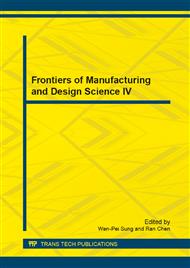p.1613
p.1617
p.1622
p.1626
p.1630
p.1634
p.1638
p.1643
p.1648
The MMVC for the Nth Order Linear Discrete-Time Systems under Prospective Strong Intervention
Abstract:
This paper is devoted to the issue of the modified minimal variance control (MMVC)for the nth linear discrete-time systems under prospective strong intervention (PSI). At fist, establish the Nth order linear discrete time system model. Based on the research of the first-order linear discrete time systems under PSI with the constraint of minimal variance control, the algorithm is extended to the nth order linear discrete time systems, so one can get MMVC of the nth order linear discrete-time systems with constraint under PSI and by introducing two parameters to proof.
Info:
Periodical:
Pages:
1630-1633
Citation:
Online since:
January 2014
Authors:
Price:
Сopyright:
© 2014 Trans Tech Publications Ltd. All Rights Reserved
Share:
Citation:


